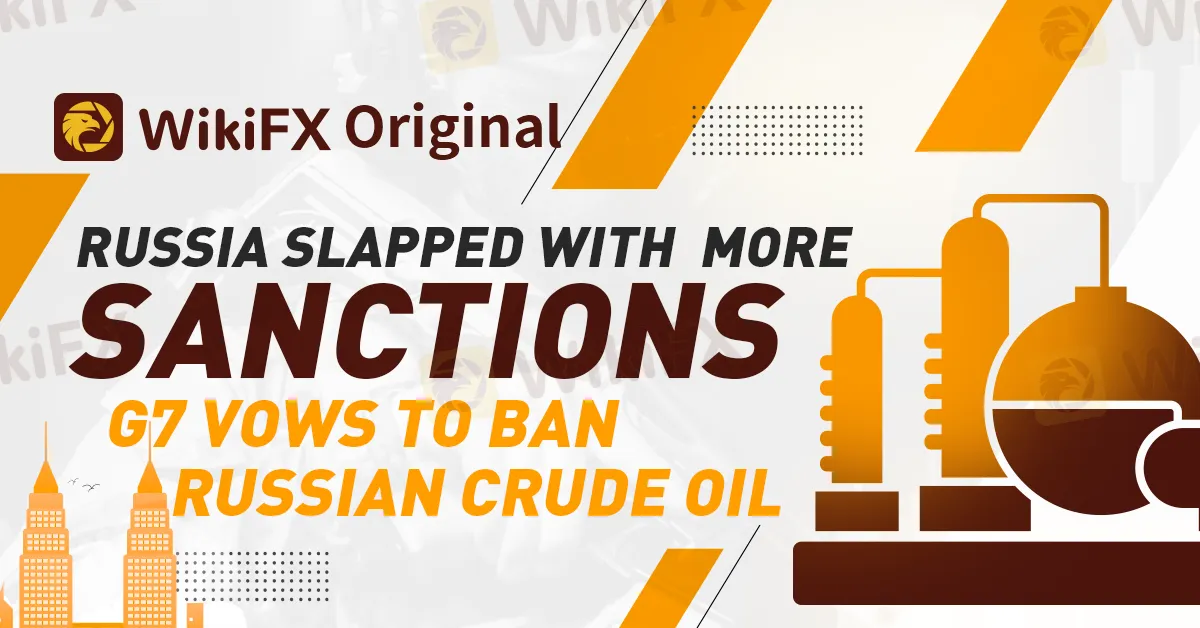简体中文
繁體中文
English
Pусский
日本語
ภาษาไทย
Tiếng Việt
Bahasa Indonesia
Español
हिन्दी
Filippiiniläinen
Français
Deutsch
Português
Türkçe
한국어
العربية
Russia Slapped with More Sanctions | G7 Vows to Ban Russian Crude Oil
Abstract:America’s newly imposed sanctions on Russia will start to take effect on the 9th of May. The British government also expands its new round of sanctions and increases tariffs on precious metal exports to Russia. G7 steps in to gradually ban Russian crude oil.

<WikiFX Malaysia Original: Editor – Fion>
More sanctions on Russia by the U.S. and the U.K.

According to a White House statement released on May 8, the U.S. will impose a new round of sanctions against Russia. Firstly, the U.S. will ban Russian companies and citizens from using U.S. accounting, marketing, and consulting services. The U.S. also intends to sanction three major Russian state-owned television stations and impose additional export controls on Russia's industrial sector. The new export controls will prohibit U.S. exports to Russia of industrial products such as engines and bulldozers. These sanctions are expected to take effect on May 9. Also, the U.S. imposes visa restrictions on 2,600 Russian and Belarusian officials and sanctions on Russian bank executives.
Britain's International Trade Department said that the U.K. will significantly increase tariffs by an additional 35% on 1.4 billion pounds worth of Russian imports, mainly precious metals such as platinum and palladium and chemicals.
In addition, the British government will also prohibit the export of goods to Russia, including key materials in the fields of chemicals, plastics, rubber, and machinery, worth more than 250 million pounds. With this round of sanctions, the total value of British products targeted at Russia for full or partial trade sanctions since the outbreak of the Russo-Ukrainian war exceeds 4 billion pounds. Previous rounds of UK sanctions have mainly targeted the energy sector, and have also included freezing the assets of Russia's largest banks, as well as sanctioning individuals and organizations primarily involved in information and media.
G7 steps in to ban Russian oil and looks for other options

Leaders of the G7 countries have announced to gradually ban imports of Russian crude oil during a video conference with Ukraines President Zelensky on Sunday.
Several members of the G-7 have expressed a commitment to diversifying their energy supplies and reducing their dependence on Russian supplies. The United States and Britain have announced bans on imports of Russian oil, while Germany, the largest economy backbone of the European Nation (EU), declares its determination to free the EU from Russian supplies by next January.
According to the G7 statement, country leaders will gradually work to eliminate dependence on Russian energy, including by slowly reducing or prohibiting imports of Russian oil. This approach would be performed in a timely and orderly manner in order to not further disrupt the global oil prices. Moreover, these leaders will work in collaboration with partners to transition to clean energy resources in accordance with climate goals.
The statement also included a commitment to continuously restrict Russian banks‘ ties with the outside economy that is critical to the Russian financial system; to curb Moscow’s propaganda; and to reduce the support of Putin from elite families that could potential provide financial support.
<WikiFX Malaysia Original: Editor – Fion>

Disclaimer:
The views in this article only represent the author's personal views, and do not constitute investment advice on this platform. This platform does not guarantee the accuracy, completeness and timeliness of the information in the article, and will not be liable for any loss caused by the use of or reliance on the information in the article.
Read more

Top 10 Trading Indicators Every Forex Trader Should Know
Master the top 10 Forex trading indicators to analyze real-time Forex quotes, trends, and market signals. Learn strategies to boost accuracy and avoid mistakes.

Geopolitical Events: What They Are & Their Impact?
You've heard many times that geopolitical events have a significant impact on the Forex market. But do you know what geopolitical events are and how they affect the FX market? Let us learn about it today.

Why Do You Feel Scared During Trade Execution?
Trade execution is a pivotal moment for traders. It is when analysis turns into action, and potential profits or losses become reality. However, for many traders, this moment is accompanied by fear. Why does this happen, and how can you address it?

WikiEXPO Global Expert Interview: Simone Martin—— Exploring Financial Regulation Change
In the midst of financial innovation and regulation, WikiGlobal, the organizer of WikiEXPO, stays abreast of industry trends and conducts a series of insightful and distinctive interviews on pivotal topics. We are delighted to have the privilege of inviting Simone Martin for an in-depth conversation this time.
WikiFX Broker
Latest News
Geopolitical Events: What They Are & Their Impact?
Volkswagen agrees deal to avoid Germany plant closures
Top 10 Trading Indicators Every Forex Trader Should Know
TradingView Launches Liquidity Analysis Tool DEX Screener
MultiBank Group Wins Big at Traders Fair Hong Kong 2024
WikiEXPO Global Expert Interview: Simone Martin—— Exploring Financial Regulation Change
'Young investors make investment decisions impulsively to keep up with current trends' FCA Reveals
Why Do You Feel Scared During Trade Execution?
CySEC Settles Compliance Case with Fxview Operator Charlgate Ltd
Malaysian Influencer Detained in Taiwan Over Alleged Role in Fraud Scheme
Currency Calculator


